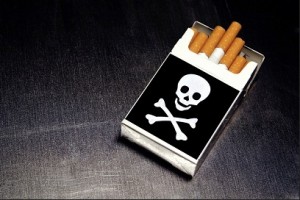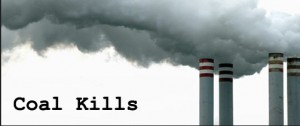It’s time to label sacks of coal like we do packs of cigarettes: SMOKING KILLS
We know smoking cigarettes, according to their labels, KILLS or “Seriously harms you and others around you.”
Smoking coal has similar effects, and deserves similar treatment or regulatory control, as smoking cigarettes. Smoking coal not only harms those who smoke it but also those around them — in the same household and neighborhood and town — and everybody everywhere as it is killing our planet by emitting greenhouse gases (GHGs).
The struggle to control cigarettes has not been easy, and we can expect no less opposition from coal interests. Some of the same arguments, public relations consultants, and lawyers supporting the tobacco industries have been joined together again by fossil fuel interests to oppose any climate change legislation.
In the 1940s through the present, there has been a concerted effort to reduce or eliminate the risks from people smoking cigarettes, and it has worked. The risks are clear enough, and there is no dispute about those risks. Medical research has demonstrated that people who smoke a lot are in serious danger of getting lung cancer or other diseases. The solution is equally clear: do what we can to stop people from smoking, short of a total ban on the product. The preventive actions have included significantly raising the taxes on cigarettes; banning advertisements for cigarettes in some media and for some targeted audiences (like young people); information campaigns to educate people, especially young people about the risks.
How does coal compare to cigarettes?
Benefit
One fundamental distinction is that smoking cigarettes produces profits for tobacco companies, and some satisfaction for smokers, but few other benefits. Burning coal provides substantial profits for fossil fuel companies, some of which is spent to oppose climate change legislation. But coal also provides cheap energy, especially for poor people, who are then harmed by inhaling air laden with coal emissions.
Addiction
Both cigarettes and coal are addictive but in very different ways. Tobacco is close to a true physical and/or psychological addiction that can cause physical withdrawal symptoms. It can be very hard to stop smoking.
Coal and other fossil fuels are addictive, metaphorically speaking only. We rely on coal because it is easily available, and cheap, and we are used to relying on it. But we do not have a need for it, either physically or psychologically. If we received electricity or power from a plant powered by solar, we would not notice any difference between that power and power from a coal plant. Except our air would be cleaner.
Thus, it can be easy to wean people off coal.
Sierra Club
Second-Hand Risks
One of the impacts from smoking that drove a nail in tobacco’s coffin was second-hand smoke. Not only was smoking by individuals harmful to the smokers, but smoking affected others, especially non-smokers, who were being harmed by the smoke. So smoking in most public places and offices, and elsewhere, was banned to protect against the second-hand health risks. Banning worked and removed the risk.
Second-hand risks from coal are different. Second-hand smoke from cigarettes harms those in the immediate vicinity of smokers. Banning smoking from places where others can be affected is relatively easy once the political will has been formed.
With coal, second-hand impacts are those affecting people who are not themselves using coal but who are affected by those who do smoke coal. For example, someone burning a coal fire in their home fireplace exposes themselves and others in the home to the effects of inhaling smoke from coal (same with peat). People in the same village or town are also exposed to the effects of coal fires, even when these other people do not smoke coal.
In addition, “second-hand smoke” from burning coal in power plants affects the planet and exposes everybody to increased air pollution and GHG emissions.
The environmental disaster in the London fog of 1952 killed between over 4,000 and 12,000 people because of the heavy fog that trapped the emissions from millions of domestic coal fires. The disaster lead to Britain’s Clean Air act in 1956. Burning dirty coal was banned in Dublin and some other towns in the 1990s because of the dangers to people’s health, and air pollution remains elevated still in areas of Ireland where coal fires continue to burn.
So restricting or banning coal, in part because of its second-hand risks, has been done in the past and has been effective.
Labelling
Let us say that a consensus forms and we develop the political will to label coal like we do cigarettes. Cigarettes are generally bought in packs and labeling the packs with big, bold lettering has been easy.
What do we do with coal?
First, for those limited number of people who still actually buy sacks of coal, we can label them like the cigarette packs with large-type, bold messages, e.g., SMOKING COAL KILLS US AND OUR PLANET. Second, for those who get their coal delivered by a truck that dumps the coal down a coal shute, we can label the trucks with the same big, bold lettering like the sacks. We currently make trucks delivering toxic substances to have changeable symbols visible on the truck to assist emergency workers in case there is an accident involving the truck. Doing the same with coal would not be difficult.
Third, if the coal is delivered to a power plant by railroad cars, we can apply the same big, bold lettering to the side of each railroad car, which can be covered over or removed if other, safer, products are carried in the railroad cars at other times.
Fourth, the biggest challenge would be when we use energy from a power plant that burns coal. We could do what Greenpeace often does, but through legislation, and require that huge banners be hung from the smoke stacks of such plants with the same message: SMOKING COAL KILLS US AND OUR PLANET.
We could also require the operators and owners of the power plants that burn coal to add to each bill we receive for our energy use a statement, in large bold letters, something like: “WE SMOKE COAL TO GIVE YOU POWER. SMOKING COAL KILLS US AND OUR PLANET. Sorry about that. Your friendly power company.”
Conclusion
Sounds unlikely you say, but what the hell, it’s worth thinking about.
Sources
Naomi Oreskes and Erik M. M. Conway, Merchants of Doubt: How a Handful of Scientists Obscured the Truth on Issues from Tobacco Smoke to Global Warming, Bloomsbury Press, 2011.
“Climate Risks as Conclusive as Link between Smoking and Lung Cancer,” Scientific American (19 march 2014). www.scientificamerican.com/article/climate-risks-as-conclusive-as-link-between-smoking-and-lung-cancer/




No comments yet, add your own below